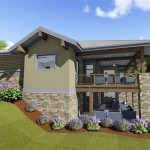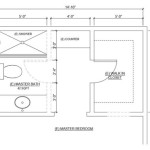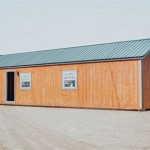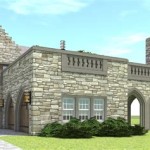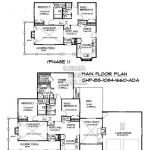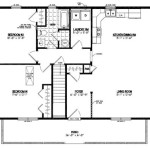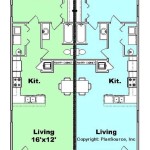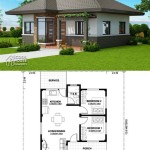Tiny Timber Frame Cabin Plans: A Comprehensive Guide
The allure of a small, self-sufficient dwelling, particularly a timber frame cabin, is increasingly attractive in a world that often feels overly complex and disconnected from nature. Tiny timber frame cabin plans offer a pathway to simpler living, providing a cozy, durable, and aesthetically pleasing structure. This article provides a comprehensive overview of the key considerations, design elements, and practicalities involved in selecting and implementing tiny timber frame cabin plans.
Timber framing, a traditional building method employing heavy timbers joined with mortise and tenon joints, offers several distinct advantages over conventional stick-built construction. These include inherent structural strength, aesthetic appeal, and the potential for using locally sourced materials. When scaled down to a tiny house footprint, these advantages are amplified, resulting in a dwelling that is both structurally robust and highly efficient in its use of space. The selection of suitable plans, however, requires careful consideration of various factors, including site characteristics, budget constraints, personal preferences, and applicable building codes.
Key Considerations Before Selecting Tiny Timber Frame Cabin Plans
Before embarking on the journey of building a tiny timber frame cabin, several crucial factors must be addressed to ensure a successful outcome. Ignoring these preliminary steps can lead to costly mistakes and delays.
Site Evaluation: The location of the cabin is paramount. A thorough site evaluation should assess soil conditions, drainage patterns, sun exposure, wind direction, and access to utilities. Soil testing is critical to determine the load-bearing capacity of the ground and to inform foundation design. Proper drainage is essential to prevent water damage and ensure the long-term stability of the structure. Optimizing sun exposure can significantly reduce heating and cooling costs, while understanding wind patterns can influence the placement of windows and doors. Access to utilities, such as water, electricity, and septic systems, also needs to be evaluated, as connecting to these services can be a significant expense, especially in remote locations. Zoning regulations and building codes must also be researched at this stage to ensure compliance with local requirements.
Budget Planning: Developing a realistic budget is essential for managing project costs and avoiding financial surprises. A detailed budget should encompass all aspects of the project, including the cost of the plans, materials (timber, insulation, roofing, windows, doors, etc.), labor (if hiring contractors), permits, site preparation, and utility connections. It is prudent to include a contingency fund to cover unexpected expenses. Obtaining multiple quotes from suppliers and contractors can help to ensure competitive pricing. Consider alternative materials and construction techniques to reduce costs without compromising quality. For instance, locally sourced timber may be more affordable than imported wood. Salvaged or reclaimed materials can also offer cost savings and add character to the cabin.
Design Preferences and Functionality: Clearly defining personal design preferences and functional requirements is crucial for selecting the right tiny timber frame cabin plans. Consider the intended use of the cabin (e.g., weekend retreat, full-time residence, rental property) and the number of occupants. Determine the desired layout, including the size and location of the living area, kitchen, bathroom, and sleeping space. Think about storage needs and how to maximize space efficiency. Consider accessibility requirements, especially if planning for long-term occupancy. Explore different architectural styles and interior design options to create a cabin that reflects individual taste and lifestyle. Gather inspiration from magazines, books, and online resources to refine design preferences. It's also important to consider the overall aesthetic of the surrounding environment. For example, a rustic timber frame cabin would blend seamlessly into a woodland setting.
Elements of Effective Tiny Timber Frame Cabin Plans
Well-designed tiny timber frame cabin plans incorporate several key elements that optimize functionality, comfort, and structural integrity. A focus on efficient space utilization, natural lighting, and proper ventilation is paramount.
Space Optimization: In a tiny house, every square foot counts. Efficient space optimization is crucial for maximizing functionality and comfort. Multi-functional furniture, such as sofa beds and folding tables, can help to save space. Built-in storage solutions, such as shelving and drawers, can eliminate the need for bulky furniture. Vertical space should be utilized effectively through the use of lofts and high ceilings. Open floor plans can create a sense of spaciousness. Careful consideration should be given to the placement of fixtures and appliances to minimize clutter and optimize workflow. For example, a galley kitchen can be a highly efficient use of space in a tiny cabin.
Natural Lighting and Ventilation: Adequate natural lighting and ventilation are essential for creating a healthy and comfortable living environment. Large windows or skylights can bring in ample natural light, reducing the need for artificial lighting and creating a more cheerful atmosphere. Proper ventilation helps to prevent moisture buildup and improve air quality. Cross-ventilation, achieved by strategically placing windows and doors, allows for natural airflow. Operable windows and vents can be used to regulate temperature and humidity. Consider the orientation of the cabin to maximize sunlight exposure during the winter months and minimize glare and heat gain during the summer months. Overhangs and awnings can provide shade and help to regulate indoor temperature.
Structural Integrity and Durability: Timber framing inherently provides exceptional structural strength and durability. However, careful attention must be given to the design and construction details to ensure long-term performance. Proper joint design is critical for ensuring the stability of the timber frame. High-quality timber should be used to resist rot and insect infestation. The foundation must be properly designed to support the weight of the cabin and to prevent settling or movement. The roof must be properly constructed to withstand the elements and to prevent leaks. The overall design should consider local climate conditions, such as snow load and wind resistance. Regular maintenance, such as inspecting and treating the timber, is essential for preserving the structural integrity and extending the lifespan of the cabin.
Key Factors in Implementing Tiny Timber Frame Cabin Plans
Successful implementation of tiny timber frame cabin plans requires careful planning, meticulous execution, and adherence to building codes and regulations. This phase will often determine the overall success and longevity of the structure.
Material Selection and Sourcing: Choosing the right materials is crucial for achieving the desired aesthetic, performance, and durability. Locally sourced timber is often a sustainable and cost-effective option. Consider the species of timber and its suitability for the local climate. Ensure that the timber is properly seasoned and treated to prevent rot and insect infestation. Select high-quality insulation materials to maximize energy efficiency. Choose roofing materials that are durable and aesthetically pleasing. Opt for energy-efficient windows and doors to reduce heating and cooling costs. Consider using reclaimed or salvaged materials to add character and reduce environmental impact. Establish relationships with reputable suppliers and contractors to ensure timely delivery and quality workmanship.
Construction Techniques and Skill Requirements: Timber framing requires specialized skills and knowledge. Familiarity with traditional joinery techniques is essential. Accurately cutting and assembling the timber frame requires precision and attention to detail. Proper lifting and rigging techniques are necessary to safely handle heavy timbers. Sheathing, insulation, and roofing require specific construction methods. Plumbing, electrical, and HVAC systems must be installed in accordance with building codes. If lacking the necessary skills, consider hiring experienced timber frame builders or contractors. Alternatively, enroll in a timber framing workshop to learn the basics. Plan the construction process carefully and break it down into manageable steps. Consider using prefabricated timber frame kits to simplify the construction process.
Permitting and Inspections: Obtaining the necessary permits and complying with building codes is essential for ensuring the legality and safety of the cabin. Research local zoning regulations and building codes to determine the requirements for tiny houses. Submit detailed plans and specifications to the local building department for approval. Schedule inspections at various stages of construction to ensure compliance with building codes. Work closely with building inspectors to address any issues or concerns. Failure to obtain the necessary permits or comply with building codes can result in fines, delays, or even demolition. Understanding and adhering to these regulations are critical for a smooth and lawful building process.

14 X 16 Tiny Timber Frame Cabin Black Dog Timberworks

Tiny Timber Frame Houses House Blog

Cabin W Porch Timber Frame Tiny House Homes

Timber Frame Kits Kennebec Framing Cabin Tiny House Building A Shed Plans

Chelwood Cabin Timber Frame Plans 695sqft Streamline Design

12 16 Tiny Timber Frame House Hq

Timber Frames For Tiny Homes In Fleetwood Nc
Tiny Timber Frame Cabin 3d Warehouse

Cabin Plans Timber Frame Hq

1216 Tiny Timber Frame House Plan
Related Posts

